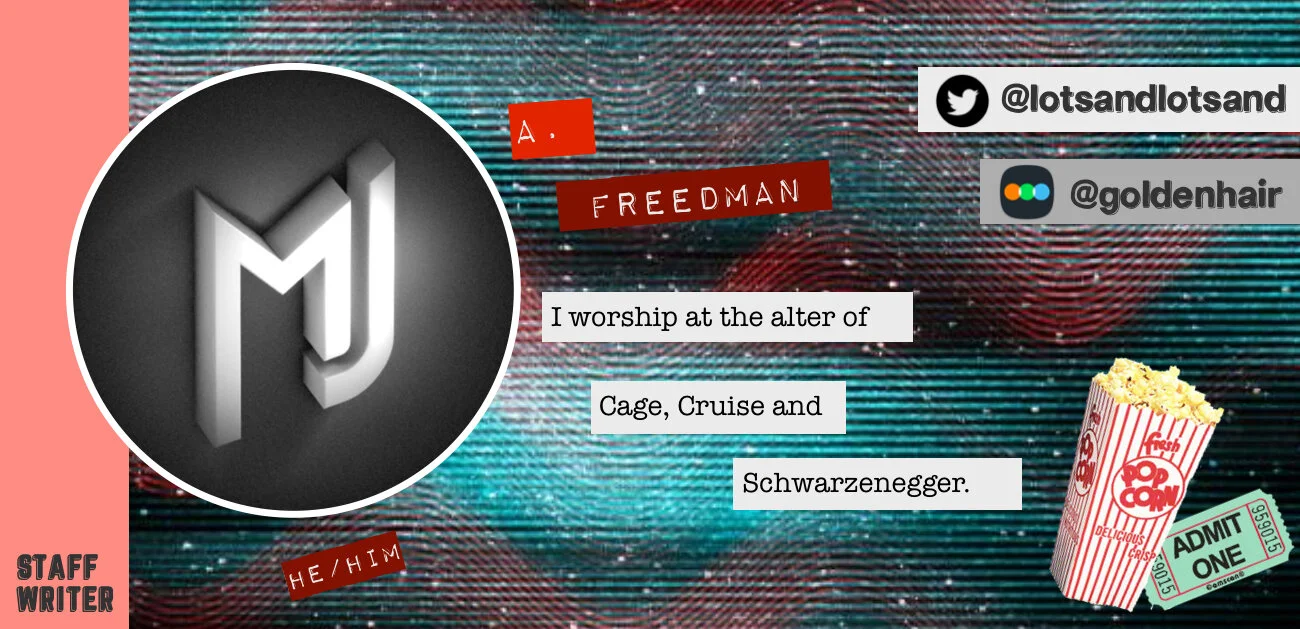LAST NIGHT IN SOHO is a terrific passion project from Edgar Wright
Directed by Edgar Wright
Written by Edgar Wright, Krysty Wilson-Cairns
Starring Thomasin McKenzie, Anya Taylor-Joy, Matt Smith, Diana Rigg
MPAA Rating: R
Runtime: 116 Minutes
Release Date: October 29th, 2021
by A. Freedman, Staff Writer
Edgar Wright loves movies. You could probably say that about any filmmaker, but with Wright, he wears it more on his sleeve. Last Night In Soho, his sixth film, is a sort of love letter to the movies, more so than any of the five other films he's done so far. A bright canvas of dark reds and blues, it is a horror film ignited with the fear that every young artist has, that maybe things were better yesterday and they missed the boat on the good art, the good places, the good times. Like any film about contending with the glorified past, Last Night In Soho complicates our perceptions of it just a little bit. It takes the so-called good times of 1960s London and explores how much darkness was there in between the bright lights.
Last Night In Soho opens up with Eloise (Thomasin McKenzie) dancing about happily in her bedroom to a jangly tune, wearing a hand-sewn dress. You don't know where we are, but you also don't know when we are. Soon enough you get the sense that it isn't the 1960s- it is today- but Eloise sure wishes it was the 1960s. She would do anything to have lived through swingin' London of that era- and in a sense, her passion for fashion and dressmaking allows her to travel back in time, if only for a moment. Eloise seems like a clear stand-in for Wright, an artist who is always happy to flood his films with music, images and references of yesterday.
Eloise gets the chance of a lifetime when she gets accepted into a prestigious fashion academy in London. Hailing from the British countryside, Eloise has a few skeletons in her closet, including a deceased mom who pops up every once in a while to check in on her. Is she really there? Is Eloise some kind of a medium or is she losing her grip on reality? We don't really know, but she goes bouncing off to her new city life just the same. As the dorm life proves to be a challenge, she opts to move into a spare room in a house where Miss Collins (Diana Rigg, who died last year) lives alone. It isn't long before Eloise falls asleep on her first night and is thrust into a vivid dreamland where she follows- or inhabits- a beautiful young singer named Sandie (a stunningly good Anya Taylor-Joy). Suddenly, it is the mid-to-late 60s in London, right where Eloise always wanted to be. Her dreams are coming true.
Sandie doesn't seem to have much in common with Eloise, but she is the platonic ideal of a ‘60s bombshell that might have populated London. Looking like Catherine Deneuve or Brigitte Bardot, she brims with confidence as she immediately seeks a headlining singing gig at a fancy club, despite being an unknown. She finds herself in the orbit of Jack (Matt Smith), a manager-type who seems to know everyone and possibly holds the keys to her success. Each nightfall, Eloise finds herself accompanying Sandie on her adventures into London nightlife, until the perfect dream starts to unravel into something like a perfect nightmare. Who was Sandie? Why is Eloise with her every night? And what should Eloise do with the discoveries she begins to make, even as her own grip on the past and the present begins to slip?
Wright makes a sandbox for Eloise to play in, and then slowly populates it with the horrifying realities of being a young woman trying to make a career in entertainment in a different time. The plot, in addition to Sandie's very Catherine Deneuve-like style, calls to mind Roman Polanski's Repulsion. The amazing rich red color palette and school setting remind one of Dario Argento's Suspiria. As much as Eloise's perfect playground becomes a nightmare, it also becomes a staging area for many of Wright's favorite films of the era.
Last Night In Soho is Wright's least funny film. There are almost no "bits" or jokes to be found. Yet he still finds plenty of opportunities to throw in his brand of panache, with ghastly images that pack the same kind of wild energy as the visual effects of Scott Pilgrim vs. The World, and the sharp character observations of Shaun Of The Dead. Of course, it has a killer soundtrack, as we have come to expect from Edgar Wright. Soho is him grappling with his own glorification of the past, and how to reconcile the conflict of truth and fantasy. Maybe you feel like you were born a few generations too late, but if you're a white man, remember that most other people probably don't feel that way.


